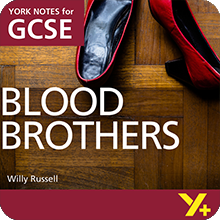Examiner's Notes
You assessed this answer as Grade 3.
Hover over the highlighted text to read the examiner’s comments.
Question: How does Russell present ideas about friendship in the play?
Write about:
- how the nature of friendship changes due to circumstance or time
- how Russell presents ideas about friendship.
Friendship, and the breakdown of friendship, are at the heart of the tragedy of ‘Blood Brothers’. Russell uses that tragedy to highlight issues of poverty and crime and their impact on real people, which he considered was the direct result of government policy in the early 1980s when the play was written.
Fate seems to play a significant part in the friendship of Mickey and Edward. Despite being separated at birth, and the best efforts of Mrs Johnstone and Mrs Lyons, they meet at the age of seven and, ironically, become best friends and blood brothers almost immediately. Russell seems to be suggesting that their shared and inevitable fate will not allow them to be separated – or perhaps their similar interests in swearing and sweets implies brotherhood. It is, though, essential to the play’s structure that the brothers are drawn to each other: the drama relies on their friendship.
Russell manufactures coincidences in the twins’ lives: both families move from Liverpool to Skelmersdale; both boys are suspended from school; they meet again accidentally aged fourteen. When they meet, each eyes the other jealously from a distance. Crippled by a lack of confidence in their appearance, each wishes they could be ‘a little less like me’ and more ‘like that guy’. Ironically, of course, being twins, they are exactly like ‘that guy’.
There are, however, significant differences between Mickey and Edward which eventually drive them apart. In childhood, neither seems aware of any difference in their social class. Sammy calls Edward a ‘poshy’, suggesting that he and Mickey cannot possibly be friends. Mickey immediately denies it, declaring that Edward is his ‘best friend’, even though Russell has made clear to the audience that Edward is very much a ‘poshy’, speaking in standard English, living in a large house in the park, consulting the dictionary. Edward is sent to a private boarding school while Mickey goes to the local secondary modern school. Neither of the twins comments or otherwise reflects on the vast difference in opportunity, privilege or class which this represents.
It is in adulthood that this difference drives the twins apart. When Edward returns from university he finds that Mickey has married Linda, is expecting a baby and has lost his job. While Mickey feels the pressure of his responsibilities, Edward important?’. Russell frames this as a question, not a statement, revealing a great deal about Edward: he has no awareness of the privilege which Mr Lyons’s job has allowed him or the problems which poverty brings, Mickey’s response is blunt. He dismisses Edward as ‘still a kid’ and their friendship as ‘just kids’ stuff’, the adverb ‘just’ emphasising how little he thinks of it now.
From this point, the opportunities of privilege and the consequences of class become more apparent as the twins progress to their inevitable deaths. Edward returns to the parties of university; Mickey robs a filling station and is sent to prison. Edward becomes a local councillor; Mickey is released from prison addicted to anti-depressants. Whereas once Mickey was happy to take ‘sweets an’ ciggies’ from Edward, he is too proud to accept a new job and a new house from him. This is not simply because ‘a job and a house’ are a more valuable favour. It is because Mickey is now aware of the differences between himself and Edward and he resents them.
Mickey’s resentment builds when he learns that Edward has taken the ‘one thing left in my life’: Linda. However it is Mrs Johnstone’s revelation that they are twins which finally drives Mickey’s resentment to its peak: ‘I could have been him!’ Despite this jealousy of Edward, and the shooting that follows, Mickey tells Edward, ‘I was gonna shoot y’. But I can’t even do that.’ In the end, Mickey has no intention of shooting his brother: the gun goes off accidentally. Despite the tragedy of the twins’ death, and the devastating impact of social class on their friendship, Russell cannot apparently bring himself to end the twins’ relationship in the absolute tragedy of an intentional killing. He leaves the audience some small hope and faith in friendship and brotherhood at the end of the play.
